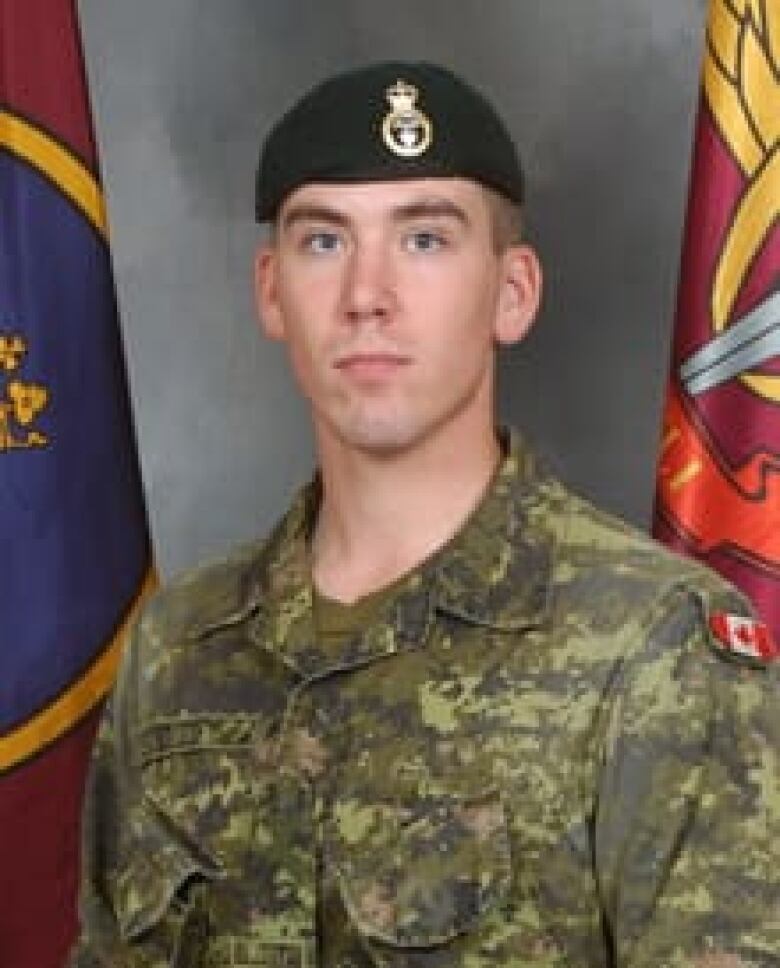Kandahar troops send fallen comrades home
Troops slowly carried the flag-draped coffins of three Canadian soldiers killed in Afghanistan during a solemn ramp ceremony Thursday at Kandahar Airfield.
Grieving soldiers lined the tarmacto honour Cpl. Stephen Frederick Bouzane, Pte. Joel Vincent Wiebe and Sgt. Christos Karigiannis. Thethree died Wednesday when their unarmoured all-terrain vehicle hit a roadside bomb near the town of Sperwan Ghar, southwest of Kandahar, astheywere transporting supplies on a well-travelled route to a checkpoint near a forward base.

Speaking from the base in Edmonton,Maj. Glen Zilkalns,acting commanding officer, said all three were excellent soldiers.
"All three men were important to us at PPCLI. Not only were they soldiers within the unit, they were our friends and comrades at arms," Zilkalns said.
"They died while performing vital work as part of [the] task force to Afghanistan; they helped bring a better life to the people of Afghanistan."
Karigiannis was on his third deployment, having twice been deployed to the former Yugoslavia. Bouzane and Wiebe were on their first deployment.
Another NATO soldier was killed Thursday in a land mine explosion and four more were wounded in eastern Afghanistan, where fighting between U.S.-led troops and suspected Taliban fighters left eight militants and a policeman dead.

The nationality of the troops was not released, although most of the NATO soldiers in the east are American.
NATO said two of the soldiers hurt in the mine blast were taken to a hospital, where one of them died. Three others were treated at the scene for minor injuries.
Sixty Canadian soldiers have died since the beginning of the Afghan mission in 2002.
"Although we have lost great friends, great young Canadians, we are not deterred from our mission," Brig.-Gen. Tim Grant said Wednesday in Afghanistan. "They're focused, they're dedicated, they know what they're doing."
N.L. flags at half-mast
As soldiers inKandahar gave their comrades a solemn farewell, the soldiers' families and communities back in Canada struggled with the news oftheir deaths.

In Newfoundland and Labrador, flags were flying at half-mast to honour the memory of Bouzane.
The 26-year-oldwas born in Little Bay, a tiny community on Newfoundland's northeast coast, but moved with his family to Scarborough, Ont., now part of Toronto,as a child. Nonetheless,his relatives in thecoastal villageof about 120 residentswere devastated by the loss.
"It's a shock — it's a shock to the whole community," Elizabeth Dobbin, one of his aunts, told CBC News.
Bouzane left instructions with his family that if anything should happen to him in combat, he wished to be buried in Little Bay.
His father, Fred, said he could tell right away that something was amiss on Wednesday.
"I went out on the bridge for a smoke and saw the three army guys walking up toward the bridge and knew then it wasn't going to be good news," he said from his home in the southern Newfoundland town of St. Alban's.
"I was proud of him on the day he was born and proud of him all his life."
Unarmoured vehicle 'appropriate' for task: Grant
Improvised explosive devices, or IEDs, have been responsible for about one-third of the Canadian deaths in Afghanistan.

Grant said the all-terrain vehicle the soldiers were in, known as an M-Gator, is often used by soldiers to transport small loads. The vehicle can handle rough terrain like the fields the three soldiers were in — fields that were covered in grape vines and riddled with dirt tracks and tall mud walls.
Grant said the M-Gator "was appropriate for the task at hand.
"But we will review how the resupply is done, the equipment that we use and the procedures in place," he added. "And if we determine that we need to change our tactics, techniques and procedures, then we will do that then."
With files from the Canadian Press and the Associated Press